【初中英语】 现在完成时易错题
九年级英语现在完成时易错练习40题(答案解析)
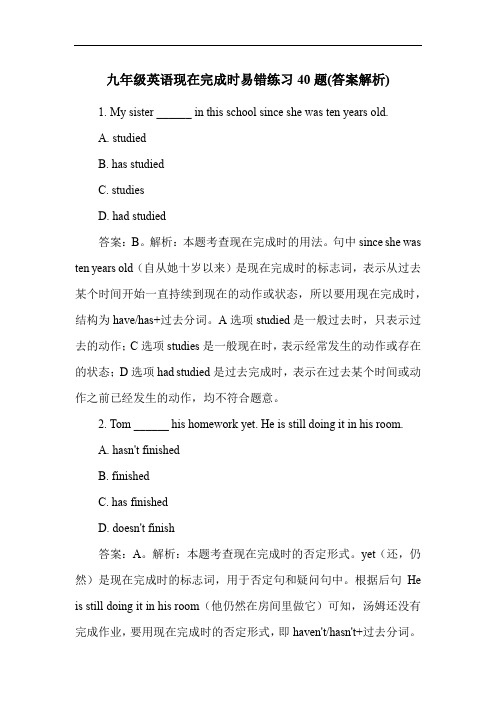
九年级英语现在完成时易错练习40题(答案解析)1. My sister ______ in this school since she was ten years old.A. studiedB. has studiedC. studiesD. had studied答案:B。
解析:本题考查现在完成时的用法。
句中since she was ten years old( 自从她十岁以来)是现在完成时的标志词,表示从过去某个时间开始一直持续到现在的动作或状态,所以要用现在完成时,结构为have/has+过去分词。
A选项studied是一般过去时,只表示过去的动作;C选项studies是一般现在时,表示经常发生的动作或存在的状态;D选项had studied是过去完成时,表示在过去某个时间或动作之前已经发生的动作,均不符合题意。
2. Tom ______ his homework yet. He is still doing it in his room.A. hasn't finishedB. finishedC. has finishedD. doesn't finish答案:A。
解析:本题考查现在完成时的否定形式。
yet(还,仍然)是现在完成时的标志词,用于否定句和疑问句中。
根据后句He is still doing it in his room 他仍然在房间里做它)可知,汤姆还没有完成作业,要用现在完成时的否定形式,即haven't/hasn't+过去分词。
B选项finished是一般过去时;C选项has finished是现在完成时的肯定形式;D选项doesn't finish是一般现在时的否定形式,均不符合题意。
3. -______ you ever ______ to the Great Wall? -Yes, I ______ there last year.A. Have; been; wentB. Have; gone; wentC. Did; go; have beenD. Have; been; have gone答案:A。
【英语】英语现在完成时易错剖析含解析
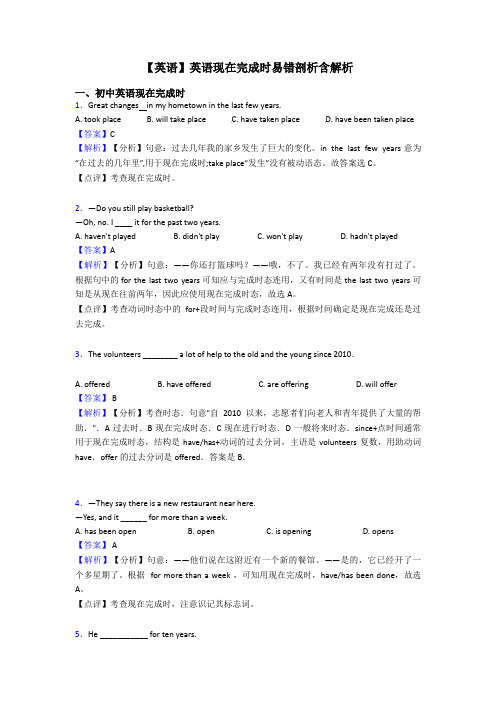
【英语】英语现在完成时易错剖析含解析一、初中英语现在完成时1.Great changes in my hometown in the last few years.A. took placeB. will take placeC. have taken placeD. have been taken place 【答案】C【解析】【分析】句意:过去几年我的家乡发生了巨大的变化。
in the last few years意为“在过去的几年里”,用于现在完成时;take place“发生”没有被动语态。
故答案选C。
【点评】考查现在完成时。
2.—Do you still play basketball?—Oh, no. I ____ it for the past two years.A. haven't playedB. didn't playC. won't playD. hadn't played【答案】A【解析】【分析】句意:——你还打篮球吗?——哦,不了。
我已经有两年没有打过了。
根据句中的for the last two years可知应与完成时态连用,又有时间是the last two years可知是从现在往前两年,因此应使用现在完成时态,故选A。
【点评】考查动词时态中的for+段时间与完成时态连用,根据时间确定是现在完成还是过去完成。
3.The volunteers ________ a lot of help to the old and the young since 2010.A. offeredB. have offeredC. are offeringD. will offer【答案】 B【解析】【分析】考查时态.句意"自2010以来,志愿者们向老人和青年提供了大量的帮助.".A过去时.B现在完成时态.C现在进行时态.D一般将来时态.since+点时间通常用于现在完成时态,结构是have/has+动词的过去分词,主语是volunteers复数,用助动词have.offer的过去分词是offered.答案是B.4.—They say there is a new restaurant near here.—Yes, and it ______ for more than a week.A. has been openB. openC. is openingD. opens【答案】 A【解析】【分析】句意:——他们说在这附近有一个新的餐馆。
【英语】 现在完成时易错题经典1

【英语】现在完成时易错题经典1一、初中英语现在完成时1.Great changes in my hometown in the last few years.A. took placeB. will take placeC. have taken placeD. have been taken place 【答案】C【解析】【分析】句意:过去几年我的家乡发生了巨大的变化。
in the last few years意为“在过去的几年里”,用于现在完成时;take place“发生”没有被动语态。
故答案选C。
【点评】考查现在完成时。
2.My father ____ in a panda protection center for 10 years, so he knows a lot about panda.A. was workingB. is workingC. has workedD. will work【答案】 C【解析】【分析】句意:我父亲在熊猫保护中心工作了10年,所以他对熊猫很了解。
由句中的语句for 10 years 提示可知,此句要用现在完成时,主语my father,助动词要用has,故选C。
【点评】考查现在完成时的基本结构及用法,注意根据句子的时间状语判断时态。
3.—Your shoes are so old. Why don't you buy a new pair?—Because I all my money on an MP5.A. spendB. have spentC. am spendingD. was spending【答案】 B【解析】【分析】因为把所有的钱都花在MP5上,所以没钱买鞋。
强调过去发生的动作对现在的影响,应用现在完成时,故选B。
【点评】考查现在完成时的用法,强调过去发生的动作对现在造成的影响。
4.—Lucy, is your uncle a teacher?—Yes, he is. He history for nearly 20 years.A. teachesB. has taughtC. is teachingD. will teach【答案】B【解析】【分析】句意:——露西,你叔叔是老师吗?——是的,他是。
九年级英语现在完成时易错单选50题

九年级英语现在完成时易错单选50题1.I ________(visit) the Great Wall last year.A.visitedB.have visited答案:A。
本题考查一般过去时和现在完成时的区别。
last year 是明确的过去时间状语,要用一般过去时visited。
现在完成时强调过去发生的事情对现在的影响,本题只是单纯陈述去年去了长城这个过去的动作,没有对现在产生影响。
2.She ________(live) in this city for ten years.A.livedB.has lived答案:B。
for ten years 是一段时间,要用现在完成时has lived。
一般过去时只是强调过去某个时间发生的动作,不能与一段时间连用。
现在完成时表示从过去一直持续到现在的动作或状态。
3.He ________(go) to the park yesterday.A.wentB.has gone答案:A。
yesterday 是过去时间状语,用一般过去时went。
has gone 表示去了某地还没回来,本题只是单纯说昨天去了公园这个过去的动作。
4.They ________(finish) their homework an hour ago.A.finished答案:A。
an hour ago 是过去时间状语,用一般过去时finished。
现在完成时不能与明确的过去时间状语连用。
5.I ________(see) that movie before.A.sawB.have seen答案:B。
before 是现在完成时的标志词,表示以前看过那部电影,对现在有影响,即知道电影的内容等。
saw 只是过去看了,没有强调对现在的影响。
6.She ________(buy) a new dress last week.A.boughtB.has bought答案:A。
last week 是过去时间状语,用一般过去时bought。
全国通用版初三英语现在完成时易错题集锦
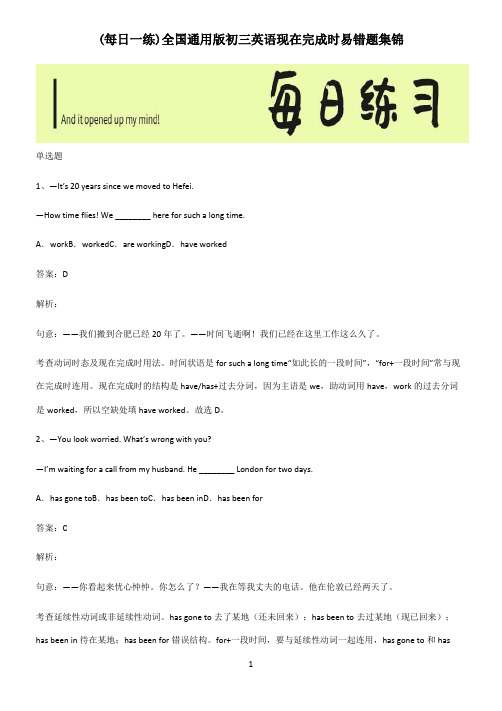
(每日一练)全国通用版初三英语现在完成时易错题集锦单选题1、—It’s 20 years since we moved to Hefei.—How time flies! We ________ here for such a long time.A.workB.workedC.are workingD.have worked答案:D解析:句意:——我们搬到合肥已经20年了。
——时间飞逝啊!我们已经在这里工作这么久了。
考查动词时态及现在完成时用法。
时间状语是for such a long time“如此长的一段时间”,“for+一段时间”常与现在完成时连用。
现在完成时的结构是have/has+过去分词,因为主语是we,助动词用have,work的过去分词是worked,所以空缺处填have worked。
故选D。
2、—You look worried. W hat’s wrong with you?—I’m waiting for a call from my husband. He ________ London for two days.A.has gone toB.has been toC.has been inD.has been for答案:C解析:句意:——你看起来忧心忡忡。
你怎么了?——我在等我丈夫的电话。
他在伦敦已经两天了。
考查延续性动词或非延续性动词。
has gone to去了某地(还未回来);has been to去过某地(现已回来);has been in待在某地;has been for错误结构。
for+一段时间,要与延续性动词一起连用,has gone to和hasbeen to都是短暂性动词,故选C。
3、— China ________ great achievements in education in the last five years.—Yes, we are proud of that.A.makesB.madeC.has madeD.making答案:C解析:句意:——在过去的五年里,中国在教育方面取得了巨大的成就。
九年级英语现在完成时易错单选50题
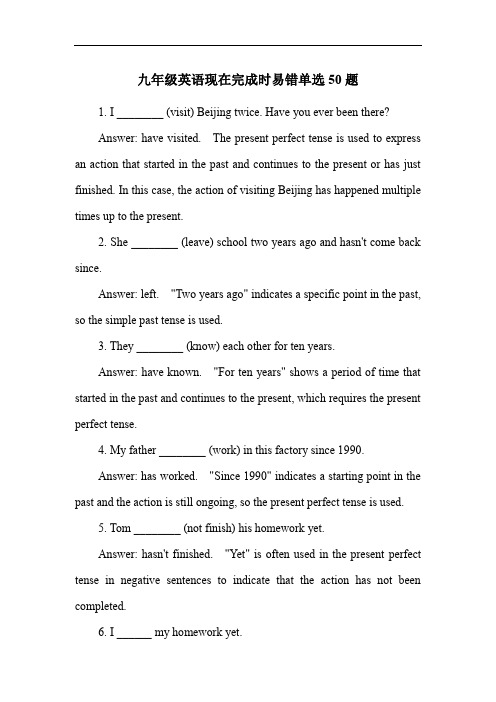
九年级英语现在完成时易错单选50题1. I ________ (visit) Beijing twice. Have you ever been there?Answer: have visited. The present perfect tense is used to express an action that started in the past and continues to the present or has just finished. In this case, the action of visiting Beijing has happened multiple times up to the present.2. She ________ (leave) school two years ago and hasn't come back since.Answer: left. "Two years ago" indicates a specific point in the past, so the simple past tense is used.3. They ________ (know) each other for ten years.Answer: have known. "For ten years" shows a period of time that started in the past and continues to the present, which requires the present perfect tense.4. My father ________ (work) in this factory since 1990.Answer: has worked. "Since 1990" indicates a starting point in the past and the action is still ongoing, so the present perfect tense is used.5. Tom ________ (not finish) his homework yet.Answer: hasn't finished. "Yet" is often used in the present perfect tense in negative sentences to indicate that the action has not been completed.6. I ______ my homework yet.A. haven't finishedB. have finishedC. finishedD. finishAnswer: A. “yet” is often used in negative sentences and questions in the present perfect tense, so “haven't finished” is the correct answer.7. They ______ in this city since 2015.A. liveB. livedC. have livedD. are livingAnswer: C. “since 2015” indicates a period of time up to the present, which requires the present perfect tense, so “have lived” is correct.8. How long ______ you ______ English?A. have; studiedB. did; studyC. do; studyD. were; studyingAnswer: A. “How long” asks for a period of time, and the present perfect tense is needed here, so “have; studied” is the right choice.9. She ______ the book for two weeks.A. has borrowedB. borrowedC. has keptD. keepsAnswer: C. “for two weeks” is a period of time, and we need a verb in the present perfect tense. “Borrow” is a momentary action, while “keep” can last for a period of time, so “has kept” is correct.10. Tom ______ never ______ to Beijing.A. has; beenB. has; goneC. is; beenD. is; goneAnswer: A. “has been” means having visited and returned, while “has gone” means having left and not returned yet. Here, the correct form is “has; been”.11. I have known him for three years. I ______ him three years ago.A. knewB. have knownC. get to knowD. got to knowAnswer: D. “three years ago” indicates a specific past time, so we use the past simple tense. “got to know” is the past form of “get to know”.12. The film has been on for half an hour. It ______ at 8:30.A. beganB. has begunC. beginsD. is beginningAnswer: A. “has been on for half an hour” shows that the action started in the past and is still ongoing. The start time was in the past, so weuse the past simple tense “began”.13. His father ______ the Party since 1978.A. joinedB. has joinedC. was inD. has been inAnswer: D. “since 1978” indicates a period of time from the past until now, so we use the present perfect tense and a durative verb. “has been in” is the correct form.14. How long can I ______ the book?A. borrowB. keepC. lendD. getAnswer: B. “How long” asks for a period of time, and we need a durative verb. “borrow”, “lend” and “get” are all momentary verbs. “keep” is durative.15. The Browns ______ China for three years.A. have come toB. have been toC. have been inD. have gone toAnswer: C. “for three years” indicates a period of time. “have come to”, “have been to” and “have gone to” are not durative. “have been in” means staying in a place for a period of time.16. Haven't they finished the project yet?A. Yes, they have.B. No, they haven't.C. Yes, they haven't.D. No, they have.Answer: B. "Haven't they finished the project yet?" is a negative question. The correct answer is "No, they haven't." which indicates thatthey haven't completed the project.17. Has she ever been to Paris?A. Yes, she has.B. No, she hasn't.C. Yes, she ever has.D. No, she ever hasn't.Answer: A or B. "Has she ever been to Paris?" is an interrogative sentence. The answer could be either "Yes, she has." if she has been to Paris or "No, she hasn't." if she hasn't.18. They haven't seen that movie, have they?A. Yes, they have.B. No, they haven't.C. Yes, they haven't.D. No, they have.Answer: A or B. This is a question in the form of a tag question. The answer depends on whether they have actually seen the movie. If they have, the answer is "Yes, they have." If they haven't, the answer is "No, they haven't."19. Hasn't he learned to play the piano?A. Yes, he has.B. No, he hasn't.C. Yes, he hasn't.D. No, he has.Answer: B. "Hasn't he learned to play the piano?" is a negative question. The correct answer is "No, he hasn't." which means he hasn't learned to play the piano.20. Have you never been to Beijing?A. Yes, I have.B. No, I haven't.C. Yes, I never have.D. No, I ever haven't.Answer: A or B. "Have you never been to Beijing?" is an interrogative sentence. The answer can be either "Yes, I have." if you have been to Beijing or "No, I haven't." if you haven't.21. I ______ my homework yet. Have you finished yours?A. haven't finishedB. finishedC. have finishedD. finishAnswer: A. “yet” is often used in the present perfect tense, and the negative form “haven't finished” is correct.22. She ______ the book since last week.A. has borrowedB. borrowedC. has keptD. keepsAnswer: C. “since last week” indicates the present perfect tense. Borrow is a short-term action and keep is a long-term state. So “has kept” is correct.23. They ______ in the city for ten years.A. livedB. have livedC. liveD. are livingAnswer: B. “for ten years” is a period of time, which requires the present perfect tense “have lived”.24. How long ______ you ______ this bike?A. have; boughtB. did; buyC. have; hadD. did; haveAnswer: C. “How long” asks for a duration, and the present perfect tense is needed. Buy is a short-term action, while have had indicates possession for a period of time.25. Tom ______ the film before.A. has seenB. sawC. seesD. seeAnswer: A. “before” suggests the present perfect tense, so “has seen” is the correct answer.26. Tom ______ Beijing. He will come back next week.A. has gone toB. has been toC. went toD. goes toAnswer: A. "has gone to" means someone has left for a place and is still there or on the way. In this sentence, Tom is still in Beijing and hasn't come back, so it should be "has gone to".27. Mary ______ the Great Wall twice.A. has gone toB. has been toC. went toD. goes toAnswer: B. "has been to" means someone has visited a place and come back. Mary has visited the Great Wall twice and returned, so it's "has been to".28. - Where is Jack?- He ______ the library.A. has gone toB. has been toC. went toD. goes toAnswer: A. The question is asking about Jack's current location. He is not here and has gone to the library.29. My parents ______ Shanghai. They will come back tomorrow.A. have gone toB. have been toC. went toD. go toAnswer: A. They are still in Shanghai and haven't returned yet, so it's "have gone to".30. Lucy ______ Hong Kong before.A. has gone toB. has been toC. went toD. goes toAnswer: B. "before" indicates that the action happened in the past and the person has come back. So, it's "has been to".31. I ______ this book for two weeks. I have to return it now.A. have borrowedB. have keptC. borrowedD. keptAnswer: B. “for two weeks” is a period of time, which requires apresent perfect tense with a延续性动词. “Borrow” is a瞬时性动词, while “keep” is a延续性动词. So, the correct answer is B.32. They ______ the Great Wall since two years ago.A. have visitedB. visitedC. have gone toD. go toAnswer: A. “since two years ago” indicates the present perfect tense. “Have visited” is the correct form. “Have gone to” means they are still there, which doesn't make sense in this context. So, the answer is A.33. How long ______ you ______ your hometown?A. have; leftB. did; leaveC. have; been away fromD. were; away fromAnswer: C. “How long” requires a present perfect tense with a延续性动词. “Be away from” is a延续性表达. So, the answer is C.34. My sister ______ in this school for three years.A. has studiedB. studiesC. studiedD. will studyAnswer: A. “for three years” is a period of time, indicating the present perfect tense. So, the answer is A.35. Tom ______ the film before.A. has seenB. sawC. seesD. will seeAnswer: A. “before” is a sign of the present perfect tense. “Has seen” is the correct form. So, the answer is A.36. I ______ my homework yet. Have you finished yours?A. haven't finishedB. finishedC. have finishedD. didn't finishAnswer: A. “yet” is often used in negative sentences and questions in the present perfect tense. The structure is “have/has + not + past participle”. So, “haven't finished” is the correct form.37. How long ______ you ______ in this city?A. have; livedB. did; liveC. do; liveD. were; livingAnswer: A. “How long” is a question word often used in the present perfect tense to ask about the duration of an action that started in the past and continues to the present. The structure is “have/has + past participle”. So, “have; lived” is correct.38. She ______ the book for two weeks.A. has borrowedB. has keptC. borrowedD. keepsAnswer: B. “for two weeks” is a period of time, and when we talk about an action that lasts for a period of time in the present perfect tense,we use a verb that can express a duration, such as “keep”. “Borrow” is a momentary action and cannot be used with “for two weeks”. So, “has kept” is the right choice.39. They ______ friends since they met in 2010.A. have beenB. have becomeC. becameD. wereAnswer: A. “since” is a key word for the present perfect tense. “Have been” is used to express a state that started in the past and continues to the present. “Become” is a momentary action and cannot be used with “since”. So, “have been” is correct.40. My father ______ the Party for over 30 years.A. has joinedB. has been inC. joinedD. was inAnswer: B. “for over 30 years” is a period of time. “Join” is a momentary action and cannot be used with a period of time. “Has been in” expresses a state that has lasted for a period of time. So, “has been in” is the correct answer.41. I have known him _for_ three years.Answer: for. “For + 时间段” is used with the present perfect tense to indicate the duration of an action or state.42. She has lived here _since_ 2010.Answer: since. “Since + 时间点” is often used with the present perfect tense to show when an action started.43. They have been married _for_ ten years.Answer: for. Here, “for ten years” indicates the length of time they have been married.44. He has worked in this company _since_ last month.Answer: since. “Since + last month” specifies the starting point of his working in the company.45. We have studied English _for_ five years.Answer: for. “For five years” tells the duration of our studying English.46. I ______ my homework yet.A. haven't finishedB. didn't finishC. won't finishD. don't finishAnswer: A. “yet” is often used in present perfect tense, and the negative form is “haven't + past participle”. So, the correct answer is A.47. They ______ this city for ten years.A. have leftB. leftC. have been away fromD. were away fromAnswer: C. “for ten years” indicates a period of time, which requires a present perfect tense and a verb that can express a duration. “Left” is a momentary action and cannot be used with “for ten years”. “Have been away from” is the correct form. So, the answer is C.48. How long ______ you ______ here?A. have; studiedB. did; studyC. do; studyD. were; studyingAnswer: A. “How long” asks for a period of time, and present perfect tense is needed. The structure of present perfect tense for this question is “have + past participle”. So, the answer is A.49. She ______ the book for a month.A. has borrowedB. has keptC. borrowedD. keepsAnswer: B. “for a month” indicates a period of time. “Borrow” is a momentary action and cannot be used with “for a month”. “Keep” canexpress a duration. The present perfect tense is “has kept”. So, the answer is B.50. We ______ never ______ to the Great Wall.A. have; beenB. have; goneC. has; beenD. has; goneAnswer: A. “never” is often used in present perfect tense. “Have been” means having visited and returned. “Have gone” means having gone and not returned yet. We are still here, so the correct form is “have been”. The subject “we” requires “have”, not “has”. So, the answer is A.。
九年级英语现在完成时易错练习40题答案解析版
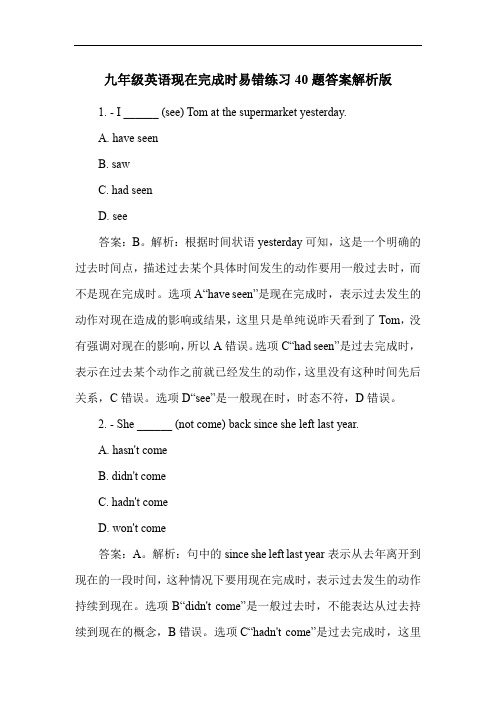
九年级英语现在完成时易错练习40题答案解析版1. - I ______ (see) Tom at the supermarket yesterday.A. have seenB. sawC. had seenD. see答案:B。
解析:根据时间状语yesterday可知,这是一个明确的过去时间点,描述过去某个具体时间发生的动作要用一般过去时,而不是现在完成时。
选项A“have seen”是现在完成时,表示过去发生的动作对现在造成的影响或结果,这里只是单纯说昨天看到了Tom,没有强调对现在的影响,所以A错误。
选项C“had seen”是过去完成时,表示在过去某个动作之前就已经发生的动作,这里没有这种时间先后关系,C错误。
选项D“see”是一般现在时,时态不符,D错误。
2. - She ______ (not come) back since she left last year.A. hasn't comeB. didn't comeC. hadn't comeD. won't come答案:A。
解析:句中的since she left last year表示从去年离开到现在的一段时间,这种情况下要用现在完成时,表示过去发生的动作持续到现在。
选项B“didn't come”是一般过去时,不能表达从过去持续到现在的概念,B错误。
选项C“hadn't come”是过去完成时,这里没有涉及到过去的过去的时间关系,C错误。
选项D“won't come”是一般将来时,时态完全不符,D错误。
3. - They ______ (finish) the project last week.A. have finishedB. finishedC. had finishedD. finish答案:B。
解析:last week是表示过去的时间状语,用于描述过去某个特定时间完成的动作,所以要用一般过去时。
(英语)英语现在完成时易错剖析含解析

(英语)英语现在完成时易错剖析含解析一、初中英语现在完成时1.He ________ for ten years.A. has been marriedB. marriedC. got marriedD. had married【答案】 A【解析】【分析】句意:他结婚十年了。
根据句意可知是从过去持续到现在的动作,应该用现在完成时。
故选A。
2.I am surprised at the new look of my hometown,for it _____ a lot over the years.A. changedB. changesC. will changeD. has changed【答案】 D【解析】【分析】我对我的家乡的新面貌感到惊讶,因为这几年改变了很多,结合over the years可知表达的动作发生在过去,对现在造成一定的影响,故用现在完成时have/has+过去分词,主语it,故has,故答案是D.3.—How do you like Treasure Island,Lucy?—It's so exciting that I _______ it twice.A. am readingB. have readC. was readingD. had read【答案】B【解析】【分析】句意:——露西,你认为《金银岛》怎么样?——它是如此令人激动以至于我读了两次。
根据twice可知已经发生了,故此处用现在完成时,故为have read,故选B。
【点评】此题考查现在完成时的用法。
4.—Where is your father?— .A. He has been to ShanghaiB. He has been in ShanghaiC. He has gone to ShanghaiD. He have been to Shanghai【答案】C【解析】【分析】句意:-你的父亲在哪儿?-他去上海了。
- 1、下载文档前请自行甄别文档内容的完整性,平台不提供额外的编辑、内容补充、找答案等附加服务。
- 2、"仅部分预览"的文档,不可在线预览部分如存在完整性等问题,可反馈申请退款(可完整预览的文档不适用该条件!)。
- 3、如文档侵犯您的权益,请联系客服反馈,我们会尽快为您处理(人工客服工作时间:9:00-18:30)。
【初中英语】现在完成时易错题一、初中英语现在完成时1.So far, the AIIB(亚投行)_____ 57 countries to be the founding members.A. attractedB. has attractedC. will attract【答案】 B【解析】【分析】句意:到目前为止,亚投行吸引了57个国家成为发起国。
So far,到目前为止,句子强调过去对现在造成的结果,用现在完成时态。
故选B。
2.All the skirts .They very well.A. sold out;are soldB. sell out;have soldC. have been sold out;sellD. have sold out;sell【答案】C【解析】【分析】句意:所有的裙子都卖完了,他们非常畅销。
第一空sell out“卖完”,强调裙子已经被卖完的状态,本句用现在完成时的被动语态:has/have+been+过去分词,sell 的过去分词为sold;第二空sell作“销售”解释时用主动语态,在此处表一直卖得很好的状态,用一般现在时。
故选C。
【点评】本题考查一般现在时和现在完成时的被动语态,注意sell的不同语态和用法。
3.—The drama series The Thunder (破冰行动) hits screens these days.—Oh. What a pity! I ____________ any of them yet,A. doesn't watchB. didn't watchC. won't watchD. haven't watched【答案】 D【解析】【分析】句意:——连续剧《破冰行动》这些天正在霸屏。
——哦。
真遗憾!我任何一集也没有看过。
根据Oh. What a pity!可知我没有看过。
过去的动作对现在造成的影响和 yet也,常和现在完成时的否定结构连用,可知此处用现在完成时。
故选D。
【点评】此题考查现在完成时。
注意yet常和现在完成时连用。
4.—How do you like Treasure Island,Lucy?—It's so exciting that I _______ it twice.A. am readingB. have readC. was readingD. had read【答案】B【解析】【分析】句意:——露西,你认为《金银岛》怎么样?——它是如此令人激动以至于我读了两次。
根据twice可知已经发生了,故此处用现在完成时,故为have read,故选B。
【点评】此题考查现在完成时的用法。
5.—Where is your father?— .A. He has been to ShanghaiB. He has been in ShanghaiC. He has gone to ShanghaiD. He have been to Shanghai【答案】C【解析】【分析】句意:-你的父亲在哪儿?-他去上海了。
Have been to去过某地(已回);have been in在……;have gone to去了某地(未回)。
本题中父亲是人们在找的人,所以是去了某地,还没回来,用have gone to。
主语he是三人称单数,用has gone to。
故选C。
【点评】本题考查现在完成时。
以及Have been to;have been in;have gone to三个短语的词义和用法。
6.—Where is your mother?—She ______ Australia and she ______ Sydney for two weeks.A. has been to; has been inB. has been to; has been toC. has gone to; has been inD. has gone to; has been to【答案】C【解析】【分析】句意:——你的妈妈在哪里?——她去了澳大利亚,她在悉尼呆了两周了。
has been to”去过某地“,现在已经回来了;has gone to”去了某地“,还没有回来;has been in”待在某地“一段时间。
根据句意Where is your mother?可知,她的妈妈还没有回来,第二个空后面有一段时间for two weeks,应该用be in,故应选C。
【点评】考查动词的时态,以及has been to ,has gone to ,has been in的含义和用法。
7.The small shop ________ for several years.A. openedB. has been openedC. has openedD. has been open【答案】 D【解析】【分析】open是非延续性动词,和表示一段时间的时间状语连用必须转化为延续性动词be open.根据句意,本句应用现在完成时态,故选D。
【点评】考查open转化为be open, be open里的open是形容词,不能加ed..8.My sister English since she was 9 years old. She can talk to foreigners freely.A. learnsB. learntC. has learntD. have learnt【答案】C【解析】【分析】句意:我的妹妹自从九岁就开始学英语,她能够和外国人自由交谈。
A,learns 学习,一般现在时,B,learnt 一般过去时C has learnt现在完成时Dhave learnt现在完成时,根据since可知句子是现在完成时,结构为have/has+过去分词,句子主语是My sister,第三人称单数,使用has,故选C【点评】本题考查现在完成时,注意since是现在完成时的标志词之一。
9.I ________ an invitation to the concert. I can't wait to go.A. receiveB. will receiveC. was receivingD. have received【答案】D【解析】【分析】句意:我已经收到音乐会的邀请,我等不及要去了。
由句意得知我已经收到去音乐会的邀请函,动作已完成造成的影响是我等不及要去,要用现在完成时,故答案选D。
【点评】考查动词时态。
根据题目所给语境推断出应使用的时态。
10.All the students _______ very hard over the last three years.A. worksB. has workedC. have workedD. worked【答案】 C【解析】【分析】Over the last three years, 用于现在完成时,又由于主语是复数,故选C。
【点评】现在完成时的时间状语要掌握。
11.Mike began to work in the factory in 2013.He there for four years.A. is workingB. was workingC. worksD. has worked【答案】D【解析】【分析】句意:迈克在这里工作已经4年了。
一直持续的状态用现在完成时。
故D选项正确。
【点评】考查现在完成时。
12.The old city_______ a lot since ten years ago.A. changedB. changesC. changeD. has changed【答案】 D【解析】【分析】这个老城市已经发生了太多改变自从十年前。
已经发生的用完成时。
【点评】考查时态的用法。
13.Little Tom his home for more than ten years.A. leavesB. left fromC. will leaveD. has been away from【答案】 D【解析】【分析】句意:小汤姆离开家已经十年了。
由句中“for more than ten years”可知. 句中的谓语动词需使用延续性动词。
leave对应的延续性动词为be away。
【点评】考查现在完成时。
14.一 Is Tom at home?— No, he to the town.A. has beenB. has goneC. goesD. will go【答案】 B【解析】【分析】考查动词的时态。
由语境可知,Tom去镇上了,现在不在家。
表示“已经去了某地”应用have gone to sp. 。
故选B。
have been to sp. 表示“去过某地”,现在已经回来了。
【点评】考查have been to与have gone to的辨析。
15.My sister in America for two years.I miss her very much.A. studiesB. studiedC. has studiedD. is studying【答案】C【解析】【分析】句意:我的姐姐在美国学习了两年了。
现在进行时表示持续大现在的状态并有可能继续持续下去。
故C选项正确。
【点评】考查现在完成时。
16.I have lived here _______ I was born.A. beforeB. whenC. forD. since【答案】 D【解析】【分析】自从我出生我就一直生活在这里。
自从用since.【点评】考查关连词的用法。
17.How long his grandfather ?A. has, diedB. has, been deathC. has, dyingD. has, been dead【答案】 D【解析】【分析】句意:他的爷爷去世多久了?has died已经去世了,不能与时间段连用;has been death形式错误,death是名词;has dying形式错误;has been dead已经去世了。
句中How long问的是一段时间,die是瞬间性动词,不能和一段时间连用,故A不对。
has been dead是一个系表结构,表示状态,可以持续。
故应选D。
【点评】考查现在完成时延续性动词与短暂性动词的转换。
die 非延续性动词,要转换为延续性的be dead。
18.I ________my dictionary to my classmate David a week ago, but he ________ it to me yet.A. lent; returnB. have lent; returnedC. lent; hasn't returnedD. have lent; didn't return 【答案】 C【解析】【分析】句意:我一周前把我的字典借给了我的同学David,但他还没还给我。
